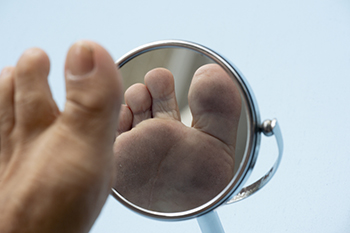
Preventing diabetic foot infections is imperative for individuals with diabetes, as they are more prone to sores and wounds on their feet. High blood sugar levels can damage nerves, leading to neuropathy, and reduce blood flow, making it harder for injuries to heal and increasing the risk of infection. Without proper care, even small cuts or blisters can develop into serious infections. To prevent these issues, diabetic patients should perform daily foot inspections, checking for any cuts, redness, or swelling. Moisturizing regularly can help to prevent dry, cracked skin that can become infected. Wearing properly fitting shoes that do not cause pressure points or blisters is essential, as is keeping feet clean and dry. Avoiding extreme temperatures protects against burns or frostbite, which can go unnoticed due to nerve damage. Nails should be cut straight across to prevent ingrown nails, which can also become infected. If you have diabetes, it is strongly suggested that you make regular appointments with a podiatrist to manage your foot health and address any concerns before they escalate.
Wound care is an important part in dealing with diabetes. If you have diabetes and a foot wound or would like more information about wound care for diabetics, consult with one of our podiatrists from Lakeside Foot and Ankle Center. Our practitioners will assess your condition and provide you with quality foot and ankle treatment.
What Is Wound Care?
Wound care is the practice of taking proper care of a wound. This can range from the smallest to the largest of wounds. While everyone can benefit from proper wound care, it is much more important for diabetics. Diabetics often suffer from poor blood circulation which causes wounds to heal much slower than they would in a non-diabetic.
What Is the Importance of Wound Care?
While it may not seem apparent with small ulcers on the foot, for diabetics, any size ulcer can become infected. Diabetics often also suffer from neuropathy, or nerve loss. This means they might not even feel when they have an ulcer on their foot. If the wound becomes severely infected, amputation may be necessary. Therefore, it is of the upmost importance to properly care for any and all foot wounds.
How to Care for Wounds
The best way to care for foot wounds is to prevent them. For diabetics, this means daily inspections of the feet for any signs of abnormalities or ulcers. It is also recommended to see a podiatrist several times a year for a foot inspection. If you do have an ulcer, run the wound under water to clear dirt from the wound; then apply antibiotic ointment to the wound and cover with a bandage. Bandages should be changed daily and keeping pressure off the wound is smart. It is advised to see a podiatrist, who can keep an eye on it.
If you have any questions, please feel free to contact our offices located in Leesburg and The Villages, FL . We offer the newest diagnostic and treatment technologies for all your foot care needs.
